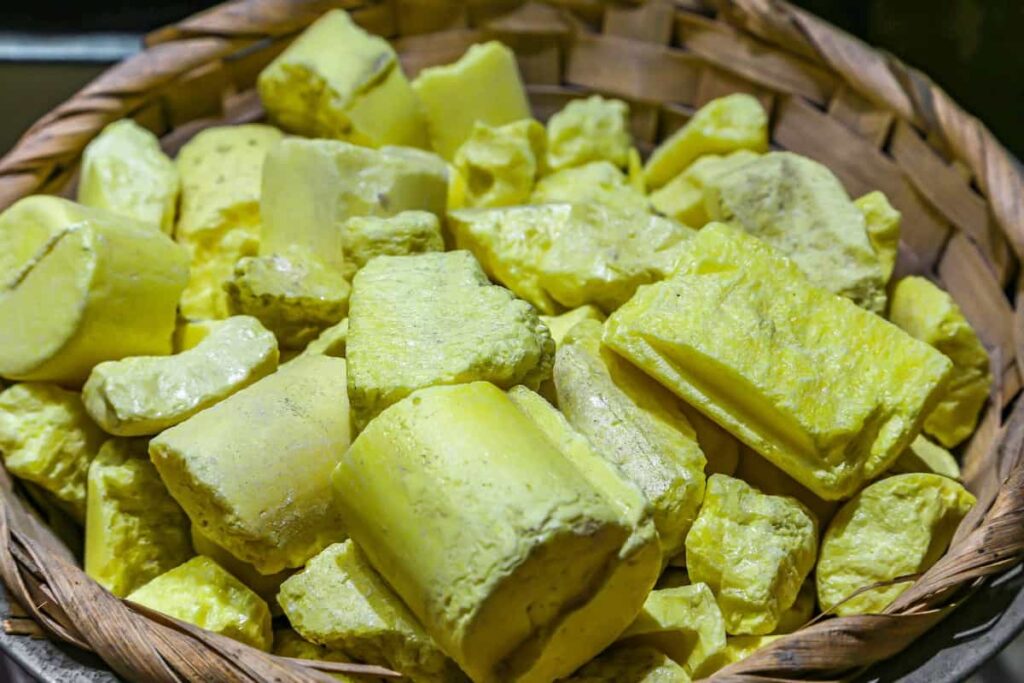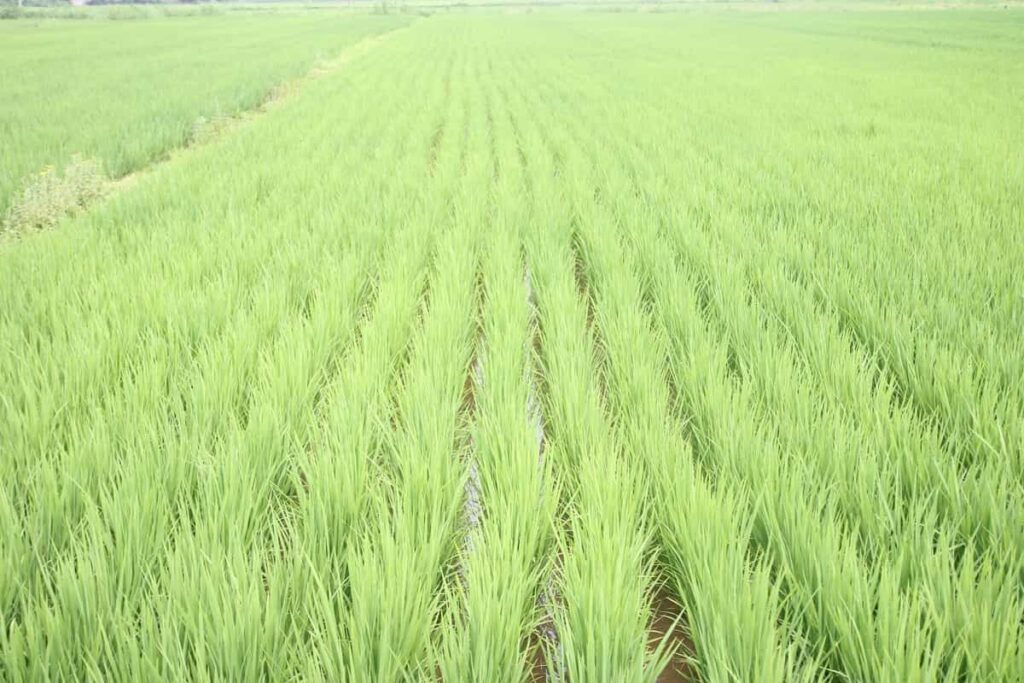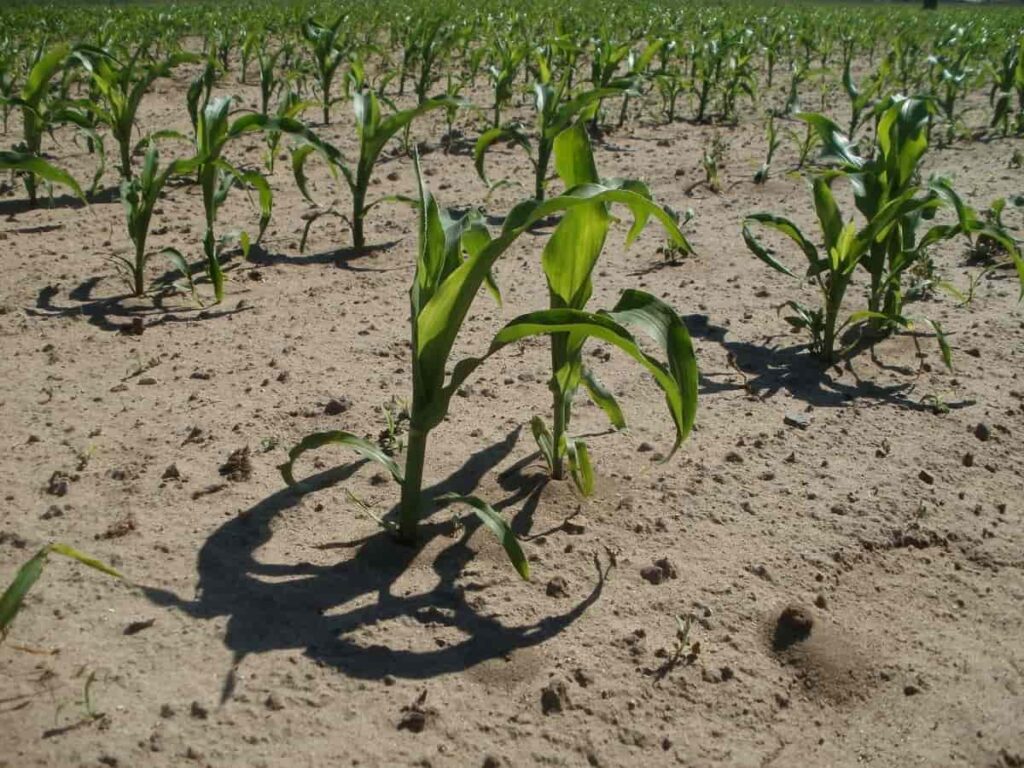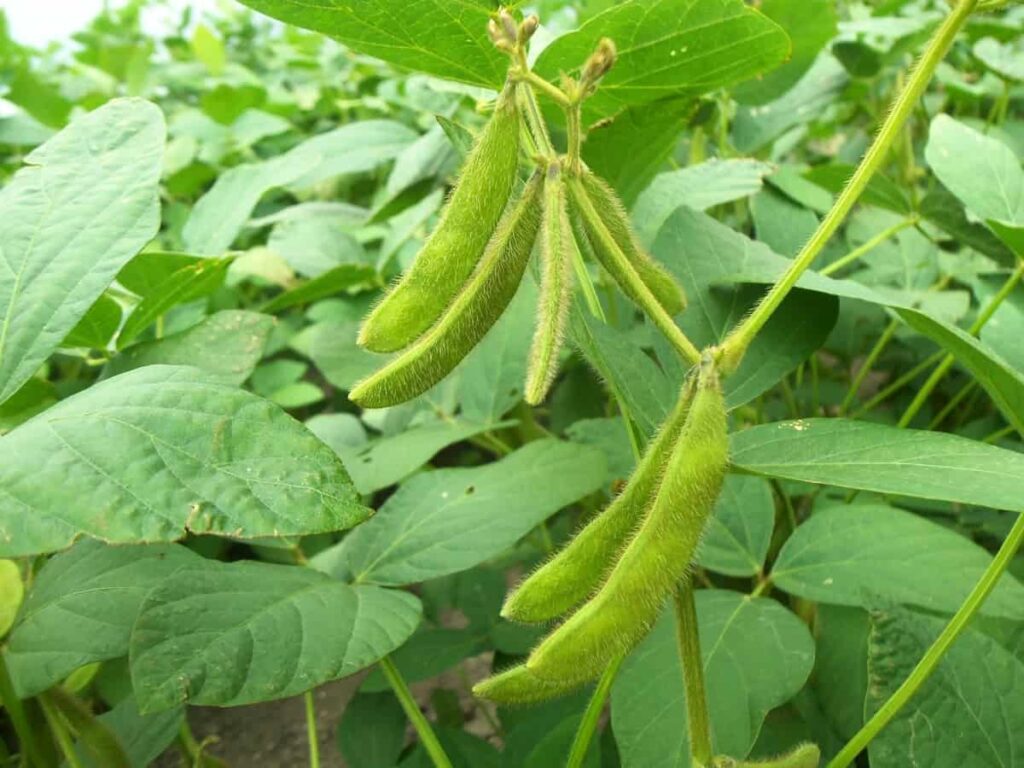Sulfur is one of the essential nutrients for plants. It plays a vital role in plant metabolism, photosynthesis, and respiration. Sulfur deficiency is a common problem in agriculture, particularly in areas with high rainfall or where sulfur-containing fertilizers are not used. There are two main ways to prevent sulfur deficiency in plants: organic and chemical.

Organic methods include the use of compost and mulch, while chemical methods involve the use of sulfur-containing fertilizers. In this blog post, we will explore organic and chemical methods for preventing plant sulfur deficiency. We also discuss about fixing Sulfur deficiency in some crops such as cotton, corn or maize, soybean, and paddy or rice.
How to fix Sulfur Deficiency in plants/soil
What is Sulfur?
Sulfur is a macronutrient that is essential for plant growth. It plays a role in several important plant processes, including photosynthesis, nitrogen fixation, and respiration. Sulfur is found in Soil, water, and air and is taken up by plants through their roots.
Importance of Sulfur to Plants
Sulfur is an essential element for plant growth. It is required to synthesize certain plant compounds, such as proteins and enzymes. Sulfur also helps to regulate the uptake of other minerals, such as nitrogen. Sulfur deficiency is a common problem in many crops, particularly in areas with high rainfall or where the Soil has been heavily leached of sulfur by acid rain.
Symptoms of sulfur deficiency include stunted growth, yellowing of leaves (chlorosis), and reduced yields. If you suspect that your plants are deficient in sulfur, you can have the Soil tested by a soil testing laboratory. Sulfur can be applied to the Soil as a fertilizer or through irrigation water.
In case you missed it: High Yield Hybrid Chilli Varieties in India: For Rabi, Kharif, Winter, Summer, and Rainy Seasons
Sulfur Deficiency in Plants
Sulfur is an essential mineral for plant growth and development. It plays a role in several important plant processes, including photosynthesis, nitrogen fixation, and protein synthesis. Sulfur is also a key component of many enzymes and vitamins. A lack of sulfur can lead to several plant problems, including stunted growth, yellow leaves, and reduced flower and fruit production. In some cases, sulfur deficiency can also make plants susceptible to disease.
There are several ways to prevent sulfur deficiency in plants. One is to use organic amendments such as compost or manure that contain high levels of sulfur. Another option is to apply chemical fertilizers that contain sulfur. If you suspect that your plants are suffering from sulfur deficiency, it’s vital to have them diagnosed by a qualified professional before taking any corrective action. This will help ensure that you take the appropriate steps to address the problem and avoid making it worse.
Causes of Sulfur Deficiency
Sulfur is an essential element for plant growth and development. It is a key component of many enzymes and proteins and plays a role in photosynthesis, nitrogen fixation, and the metabolism of carbohydrates and lipids. Sulfur deficiency is a common problem in plants, especially in agricultural settings where sulfur-rich fertilizers are not used. Sulfur deficiency can cause several plant problems, including stunted growth, yellowing leaves, and poor root development.
Several different factors can contribute to sulfur deficiency in plants. One common cause is the use of high-nitrogen fertilizers, which can leach sulfur from the Soil. Poor drainage or irrigation can also lead to sulfur deficiency, as this can prevent sulfate ions from being absorbed by the roots. In some cases, sulfur deficiency may be due to genetic factors or other minerals in the Soil that compete with sulfate for uptake by the plant roots.
Sulfur Deficiency Symptoms in Plants
Sulfur is a mineral that is essential for plant growth. It is a component of several enzymes and plays a role in photosynthesis. Sulfur deficiency is a common problem in plants, especially in areas with high rainfall or where the Soil is heavily leached. Symptoms of sulfur deficiency include yellowing of the leaves (chlorosis), stunted growth, and reduced yields.
The leaves may also be smaller than usual and have a bronze or purple tint. Sulfur-deficient plants are more susceptible to diseases and pests. To correct the sulfur deficiency, add elemental sulfur or sulfate fertilizers to the Soil. If the deficiency is severe, foliar sprays of sulfate solutions can be used.
Prevention of Sulfur Deficiency
Sulfur is an important nutrient for plant growth and is vital in many plant processes. Sulfur deficiency is a common problem in crops and can lead to stunted growth, yellowing leaves, and reduced yields. Several ways to prevent sulfur deficiency in plants, including both organic and chemical methods.
Organic prevention methods include using sulfate-rich amendments such as gypsum or elemental sulfur. Gypsum is especially effective in preventing sulfur deficiency in sandy soils. Chemical prevention methods include applying sulfate fertilizers such as ammonium sulfate or potassium sulfate. Both organic and chemical prevention methods effectively prevent sulfur deficiency in plants. However, organic methods are often preferred as they are more environmentally friendly.
Sulfur deficiency in tomato plants
Sulfur is an essential mineral for tomato plants. It helps with the formation of chlorophyll, which is necessary for photosynthesis. Sulfur also aids in the metabolism of carbohydrates and other nutrients in the plant. A sulfur deficiency can cause several problems for tomato plants, including yellowing of the leaves, stunted growth, and reduced yields. If you suspect that your tomato plants suffer from a sulfur deficiency, you can correct the problem by applying sulfur to the Soil.
How do you increase sulfur in Soil?
Sulfur is an essential plant nutrient and is required for the production of chlorophyll. It is often deficient in soils, especially sandy or with a high pH. There are several ways to increase the sulfur content of Soil, including: – Adding elemental sulfur: This can be done by purchasing fertilizer-grade elemental sulfur from a garden center or nursery and spreading it on the soil surface.
Elemental sulfur slowly breaks down into sulfate, a form of sulfur used by plants. – Applying sulphate fertilizers: These can be found in liquid and granular forms and are readily available at most garden centers. Sulphate fertilizers should be applied according to package directions. – Incorporating organic matter: This includes compost, manure, and leaves. As organic matter decomposes, it releases sulfur into the Soil.
How do you increase sulfur in Soil naturally?
Sulfur is essential for plant growth, but it can be challenging to maintain adequate levels in Soil. Sulfur is often added to agricultural soils in sulfuric acid, but this can be expensive and damage the environment. There are several ways to increase sulfur in Soil naturally, including using elemental sulfur, organic matter, and sulfate-rich materials. Elemental sulfur is a relatively inexpensive way to increase sulfur in Soil.
It is available in both granular and liquid form and can be applied to the Soil either before planting or after the crop has been harvested. Elemental sulfur can also be added to compost or used as a top dressing on the soil surface. Organic matter is another excellent way to increase sulfur in Soil. Compost or manure added to the Soil will release sulfur over time as they decompose.
This is a slow process, but it is a very effective way to build up levels of sulfur in the long term. Finally, sulfate-rich materials can be used to increase sulfur in Soil. These include gypsum (calcium sulfate), Epsom salt (magnesium sulfate), and aluminum sulfate. These materials can be applied to the Soil directly or mixed into compost. They can also be added to irrigation water to release the sulfates into the root zone of plants slowly.
How to fix the Sulfur deficiency in cotton crop
Sulfur is an important macronutrient for cotton plants, and sulfur deficiency can lead to several problems. Sulfur deficiency can reduce photosynthetic rates, stunt plant growth, and decrease yields. Sulfur is essential for cotton plants during the early stages of growth. Sulfur deficiency is relatively common in cotton-growing areas. Sulfur deficiency is caused by several factors, including low soil sulfur levels, high pH soils, and heavy rainfall.
In case you missed it: How to Start Polyculture Fish Farming In India: Composite Fish Culture, Mixed Fish Farming Examples, Benefits, and Disadvantages

Sulfur-deficient plants are often smaller than healthy plants and have yellow leaves. If you suspect your cotton plant may be sulfur-deficient, you can have your Soil tested. Your local agriculture department office can help you interpret your soil test results. If your soil test results indicate that your Soil is low in sulfur, you can amend the Soil with elemental sulfur or sulfate fertilizers.
How to fix the sulfur deficiency in rice/paddy crop
Sulfur (S) is an essential macronutrient for rice, playing a key role in plant metabolism. Sulfur deficiency is a common problem in rice production, especially in high-yielding varieties grown under intensive management. Symptoms of sulfur deficiency include yellowing of leaves (chlorosis), stunted growth, and poor tillering.
In case you missed it: 15 Best and Easiest Cut Flowers to Grow from Seed: Beautify Your Garden with These

The best way to diagnose sulfur deficiency is through Soil and tissue testing. Soil-applied sulfur can be in the form of elemental sulfur, sulfate, or thiosulfate. The soil bacteria must oxidize elemental sulfur before plants can take it up. This process can take several weeks to months, so it is ineffective to correct immediate deficiency symptoms.
Sulfate-based fertilizers are the most common form of applied sulfur and are readily taken up by plants. Thiosulfate is a rapidly acting form of sulfur that can be used to correct deficiencies quickly. Foliar applications of sulfate or thiosulfate are also effective in correcting deficiency symptoms. However, care must be taken not to damage leaves when applying these products.
How to fix the sulfur deficiency in corn/maize crop
Sulfur is an important micronutrient for corn plants and is required for proper growth and development. Sulfur deficiency can lead to stunted growth, reduced yield, and poor-quality corn. Corn plants take up sulfur through the roots. It is used in many different processes, including the synthesis of proteins and enzymes, the production of chlorophyll, and the detoxification of environmental stressors.
In case you missed it: How to Grow Cherry Tomatoes at Home: from Seeds and Tomatoes in Pots, Indoors, and Planting, Care

Sulfur deficiency can negatively impact corn plants, including stunted growth, reduced yield, and poor quality corn. To prevent sulfur deficiency in corn plants, it is important to apply sulfur-containing fertilizer to the Soil before planting. Once corn plants are established, they will need sulfur throughout their growing season. Sulfur can be applied through the leaves or roots, and foliar sprays often correct sulfur deficiencies.
How to fix the sulfur deficiency in soybean crop
Soybeans are a legume crop that is grown around the world. In the United States, soybeans are the second most common crop after corn. Soybeans are a very versatile crop, and their uses include human food, animal feed, biodiesel fuel, and more. Soybeans are a plant that requires a lot of sulfur to grow appropriately. Sulfur is an essential nutrient for plants and plays a vital role in many plant processes.
In case you missed it: High Yield Hybrid Vegetable Varieties in India: For Winter (Rabi), Summer, and Rainy Season (Kharif)

Sulfur is mainly found in the form of sulfate in the Soil. Sulfate is derived from sulfuric acid and other minerals in the Soil. Soybeans are very susceptible to sulfur deficiency. Sulfur deficiency symptoms in soybeans include yellowing of leaves, stunted growth, reduced yield, and more. Sulfur deficiency can be caused by several factors, including low sulfate levels in the Soil, high pH levels, or high temperatures, which can cause sulfate to be lost from the Soil.
Farmers can apply sulfate fertilizer to their fields to correct the sulfur deficiency in soybeans. The type of sulfate fertilizer best for soybeans depends on the specific soil conditions in each field. It is important to have your soils regularly tested to ensure they are adequate in sulfur and other nutrients.
Conclusion
Sulfur is an important nutrient for plants, and sulfur deficiency can lead to stunted growth and poor yields. Luckily, you can perform some things to prevent sulfur deficiency in your plants. Using organic methods like composting or adding sulfur-rich amendments to your Soil can help, or you can use chemical fertilizers that contain sulfate. Whatever method you choose, ensuring your plants get enough sulfur will help them grow strong and healthy.
- Profitable Village Farming Business Ideas in 2024
- High-Yield Aquaculture: Fast-Growing Fish for Farming
- Effective Fish Pond Construction Techniques for Beginners
- Irrigation and Water Management in Pineapple Farming
- Blossom to Harvest: Mastering Flowering and Pollination in Papaya Farming
- Pig Fattening Essentials: From Selection to Sale for Beginners
- Raising Wagyu Cattle: A Complete Guide for Premium Beef Production
- Soil Types and Their Water Holding Capacity
- Optimizing Irrigation Schedules for Coconut Groves for Enhanced Yield
- Espresso Your Garden: Coffee Grounds for Healthier Acid-Loving Plants
- The Best Soil Mix for Snake Plants: How to Mix Your Own Snake Plant Soil
- Green Thumb Success: Expert Tips for Cultivating Greenhouse Beans All Year Round
- Bloom All Year Round: The Ultimate Guide to Indoor Hyacinth Care
- Eco-Friendly Gardening: How to Make Liquid Fertilizer from Kitchen Waste
- Ultimate Guide to Grow Anise in Pots: Explore Seed Propagation to Harvesting
- Guide to Raising Chester White Pigs: Discover Breed Facts to Growth Management
- Mastering the Elegance: The Ultimate Guide to Weeping Cherry Tree Care, Planting, and Maintenance
- Ultimate Guide to Planting Garlic in Grow Bags: Growing Strategies for Beginners
- How to Fix Spider Plant Leaf-Related Problems: Natural and Organic Remedies
- 10 Reasons Why Your Tulsi Plant is Shedding Leaves: Home Remedies and Solutions
- Optimizing Growth and Yield: The Advantages of Palm Bunch Ash Fertilizer
- Utilizing Neem Oil Extract as a Natural Pesticide for Hydrangea
- From Soil to Harvest: Various Ways in Which Farmers Can Use AI Tools
- Steps to Encourage and Induce Citrus Flowers: A Comprehensive Guide
- How to Fix Snake Plant Leaf-Related Issues: Natural and Organic Remedies
- Transform Your Garden into a Fragrant Oasis with Raat Ki Rani (Night Blooming Jasmine)
- Discover the Ideal Chicken Breeds for Philippine Farms
- How to Create a Poultry Egg Farm Business Plan for Profits
- Grow Lemon Cucumbers Like a Pro: Insider Techniques for Bountiful Yields
- Ultimate Guide to Caring for Your Pink Princess Philodendron: Tips for Thriving Variegation
- Areca Nut Profit Per Acre: Calculating Yield and Cost of Cultivation
- How Kaveri Chicken is Becoming a More Profitable Breed in Indian Backyards
- Transform Your Barn: 9 Steps to Convert a Horse Stall into a Chicken Coop
- Exploring Suffolk Sheep Disadvantages with Limitations and Challenges
- Guide to Solving Potted Lemon Tree Problems: How to Revive Lemon Tree in Containers
- Steps to Encourage Female Pumpkin Flowers: Best Strategies for More Flowers and High Yields

